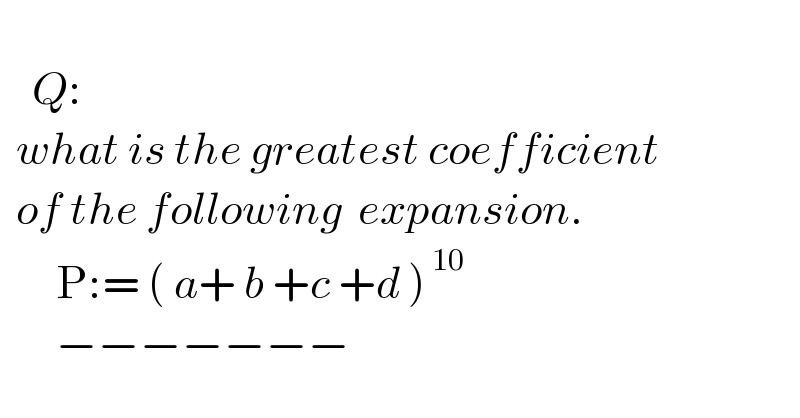
Question Number 173531 by mnjuly1970 last updated on 13/Jul/22

$$ \\ $$$$\:\:\:\:{Q}: \\ $$$$\:\:{what}\:{is}\:{the}\:{greatest}\:{coefficient} \\ $$$$\:\:{of}\:{the}\:{following}\:\:{expansion}. \\ $$$$\:\:\:\:\:\:\:\mathrm{P}:=\:\left(\:{a}+\:{b}\:+{c}\:+{d}\:\right)^{\:\mathrm{10}} \\ $$$$\:\:\:\:\:\:\:−−−−−−− \\ $$
Answered by mr W last updated on 13/Jul/22

$$\:{coefficient}\:=\frac{\mathrm{10}!}{{m}!{n}!{h}!{k}!} \\ $$$${with}\:\mathrm{0}\leqslant{m},{n},{h},{k}\leqslant\mathrm{10}\:{and}\:{m}+{n}+{h}+{k}=\mathrm{10} \\ $$$${due}\:{to}\:{symmetry},\:{largest}\:{coefficient} \\ $$$${is}\:{when}\:{m},{n},{h},{k}\:{are}\:{at}\:{most}\:{equal}\:{to} \\ $$$${each}\:{other}.\:{two}\:{cases}\:{shoulde}\:{be}\:{checked}: \\ $$$${m}={n}={h}=\mathrm{3},\:{k}=\mathrm{1}\:{or} \\ $$$${m}={n}=\mathrm{3},\:{k}={h}=\mathrm{2} \\ $$$$\left(\mathrm{3}!\right)^{\mathrm{3}} ×\mathrm{1}!=\mathrm{216} \\ $$$$\left(\mathrm{3}!\right)^{\mathrm{2}} ×\left(\mathrm{2}!\right)^{\mathrm{2}} =\mathrm{144}\:<\mathrm{216} \\ $$$$\Rightarrow{largest}\:{coef}.=\frac{\mathrm{10}!}{\mathrm{144}}=\mathrm{25200}\:\checkmark \\ $$
Commented by mnjuly1970 last updated on 13/Jul/22

$${thanks}\:{alot}\:{sir}\:{W} \\ $$
Commented by Tawa11 last updated on 13/Jul/22

$$\mathrm{Great}\:\mathrm{sir} \\ $$
